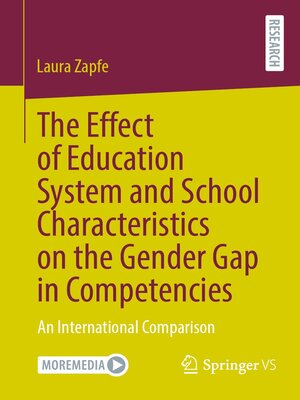The Effect of Education System and School Characteristics on the Gender Gap in Competencies
ebook ∣ An International Comparison · Education and Social Work (German Language)
By Laura Zapfe

Sign up to save your library
With an OverDrive account, you can save your favorite libraries for at-a-glance information about availability. Find out more about OverDrive accounts.
Find this title in Libby, the library reading app by OverDrive.



Search for a digital library with this title
Title found at these libraries:
| Library Name | Distance |
|---|---|
| Loading... |
Laura Zapfe's aim is to explain how education system and school characteristics affect the gender gap in mathematics and reading competencies. She adapts the macro-meso-micro model. At the micro level, she uses theories, e.g., gender-specific socialization, highlighting how gender-specific expectations and stereotypes cause gendered interest and skills and therefore gender differences in mathematics and reading. Deriving a macro-meso-micro link, she explains how education system characteristics such as competition, differentiation, and standardization, and school characteristics could increase or decrease the gender-specific socialization effects, leading to larger or smaller gender gaps in mathematics and reading competencies. On this basis, she performs a cross-national comparison of 78 countries participating in the Programme for International Student Assessment (PISA) 2018, combined with further researched macro data with three-level mixed-effects models. The results show that boys have an advantage in mathematics, girls have an advantage in reading, the gender effects are slightly higher for reading, and the gender effects at the school level are more pronounced than those at the country level.







